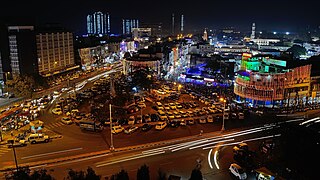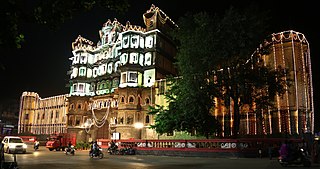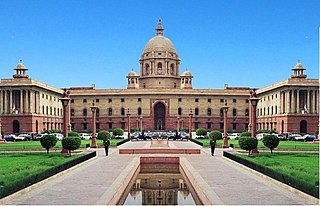
Madhya Pradesh is a state in central India. Its capital is Bhopal, and the largest city is Indore, with Jabalpur, Ujjain, Gwalior, Satna being the other major cities. Madhya Pradesh is the second largest Indian state by area and the fifth largest state by population with over 72 million residents. It borders the states of Uttar Pradesh to the northeast, Chhattisgarh to the southeast, Maharashtra to the south, Gujarat to the west, and Rajasthan to the northwest.

Bhopal is the capital city of the Indian state of Madhya Pradesh and the administrative headquarters of both Bhopal district and Bhopal division. It is known as the City of Lakes for its various natural and artificial lakes and for being one of the greenest cities in India. It is the 16th largest city in India and 131st in the world. After formation of Madhya Pradesh, the state capital Bhopal was a part of the Sehore district. It was bifurcated in 1972 and a new district Bhopal was formed. Flourishing around 1707, the city was the capital of the former Bhopal State, a princely state of the British ruled by the Nawabs of Bhopal. Numerous heritage structures from this period include the Taj-ul-Masajid and Taj Mahal palace. In 1984, the city was struck by the Bhopal disaster, one of the worst industrial disasters in history.

Indore is the most populous and the largest city in the Indian state of Madhya Pradesh. It serves as the headquarters of both Indore District and Indore Division. It is also considered as an education hub of the state and has campuses of both the Indian Institute of Technology and the Indian Institute of Management. Located on the southern edge of Malwa Plateau, at an average altitude of 553 meters (1,814 ft) above sea level, it has the highest elevation among major cities of Central India. The city is 190 km (120 mi) west of the state capital of Bhopal. Indore had a census-estimated 2011 population of 1,994,397 and 3,570,295. The city is distributed over a land area of just 530 square kilometres (200 sq mi), making Indore the most densely populated major city in the central province.

Indian law is enforced by a number of agencies. Like many federal nations, the constitution of India delegates the maintenance of law and order primarily to the states and territories.

The Central Industrial Security Force (CISF) is one of the Central Armed Police Forces in India. CISF is a unique organisation in the paramilitary forces of India, which works to provide security cover to over 300 industrial units, government infrastructure projects and facilities and establishments located all over India. Industrial sectors like atomic power plants, space installations, mines, oil fields and refineries, major ports, heavy engineering, steel plants, barrages, fertiliser units, airports and hydroelectric/thermal power plants owned and controlled by Central Public Sector Undertakings (PSUs), and currency note presses
Barwaha is a municipality and sub-district in Khargone district in the state of Madhya Pradesh, India. The Barwaha city is divided into 18 wards for which elections are held every 5 years. The Barwaha Municipality has population of 39,973 of which 20,940 are males while 19,033 are females as per report released by Census India 2011. Literacy rate of Barwaha is 87.27% higher than state average of 69.32%. In Barwaha, Male literacy is around 92.73% while female literacy rate is 81.23%.
The Ministry of Home Affairs, or simply the Home Ministry, is a ministry of the Government of India. As an interior ministry of India, it is mainly responsible for the maintenance of internal security and domestic policy. The Home Ministry is headed by Union Minister of Home Affairs Amit Shah.

The Ministry of Finance is a ministry within the Government of India concerned with the economy of India, serving as the Indian Treasury Department. In particular, it concerns itself with taxation, financial legislation, financial institutions, capital markets, centre and state finances, and the Union Budget.

The economy of Madhya Pradesh refers to the economic growth with respect to the Indian state of Madhya Pradesh. It grew 12% in GDP for the year of 2011–12, for which it received an award from then President Pranab Mukherjee in January 2013 for improving its tourism, medical and infrastructural growth. The economy of Madhya Pradesh is significantly agrarian which is reflecting rapid strides towards industrial and service sectors as well. The Indore,Bhopal and Jabalpur districts are the top 3 districts in the state's larger economy.

The Lakshmi Narain College of Technology is a technology-oriented institute of higher education established by LNCT Group of Colleges.
A government-owned enterprise, a government-owned corporation, a statutory corporation or a nationalized company in India is called a Public Sector Undertaking (PSU) or a Public Sector Enterprise (PSE). These establishments are wholly or partly owned by the government of India and/or one of the many state or territorial governments. The employees of these PSEs—Gazetted officers and their subordinates—are fully-fledged government employees. Central Public Sector Undertakings are wholly or partly owned by the government of India, while State Level Public Sector Undertakings are wholly or partly owned by state or territorial governments.

Institute Of Engineering & Science IPS Academy Indore is an Autonomous engineering education institution under UGC guidelines, located at Indore city beside NH-3 in Madhya pradesh state, India. It was established in Indore on 19 October 1999 after securing approval of the All India Council for Technical Education, New Delhi, and Government of Madhya Pradesh to commence in the 1999–2000 academic year. It ranks among the top 45 private engineering institutions in India.

Om Prakash Singh is a 1983 batch IPS officer of Uttar Pradesh cadre. He was the Director General of Uttar Pradesh Police, and had previously served as the Director General of CISF and Director General of NDRF.

The Madhya Pradesh Road Development Corporation Limited (MPRDC) is an Undertaking of Government of the state of Madhya Pradesh, India, responsible for management of a network of over 22,000 km of National Highways, State Highways and Major District Roads in Madhya Pradesh. Madhya Pradesh State has a good road network. There are 20 National Highways with total length of 4,000 km and many State Highways with total length of 9,000 km. Shri. Shivraj Singh Chouhan, Chief Minister of Madhya Pradesh is the Chairman, while Shri Shriman Shukla, IAS is Managing Director of MPRDC.

CISF Unit Delhi Metro Rail Corporation is a Central Industrial Security Force (CISF) unit responsible for providing security cover to Delhi Metro, Delhi, India. The Unit is headed by a Deputy Inspector General who is an Indian Police Service officer; the incumbent is Jitender Rana, a 2005 IPS officer from Bihar cadre. The Headquarters of the Unit is situated at Shastri Park near Delhi IT Park. It is the single largest unit of CISF in the country with sanctioned strength of 12,528 personnel. The Unit operates two control rooms for better monitoring and coordination and has different specialised wings such as the Quick Reaction Team, Dog Squad and Bomb Detection Squad.
The National Industrial Security Academy is an institution of Central Industrial Security Force (CISF) for training in industrial security and disaster management. The academy is situated in a 237-acre (96 ha) campus at Hakimpet, Medchal–Malkajgiri District, on the outskirts of Hyderabad, Telangana.
Anjana Sinha is an Indian Police Service 1990-batch officer from Andhra Pradesh-cadre. She is currently on Government of India deputation to Central Industrial Security Force at the rank of Inspector General and serves as the director of National Industrial Security Academy, Hyderabad.

The Airport Sector is one of the sectors of the Central Industrial Security Force (CISF), a Central Armed Police Force of India. The sector is responsible for providing security coverage to civil airports in India under the regulatory frame work of the Bureau of Civil Aviation Security, Ministry of Civil Aviation. Headed by a special director general of police-rank officer and headquartered at New Delhi, it is the largest sector of CISF in terms of number of personnel deployed. It provides security coverage to 63 national and international airports in the country.
The Fire Service Training Institute is an institution of the Central Armed Police Force responsible for providing training in fire safety and firefighting.
The Central Industrial Security Force Act, 1968, is an act of the Indian Parliament through which the Central Industrial Security Force (CISF) was raised on 10 March 1969. The CISF is a Central Armed Police Force which specialises in providing security and protection to industrial undertakings and other critical installations including nuclear plants, space centres and Delhi Metro. It is also the airport police of India.













